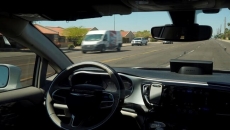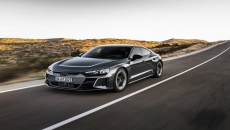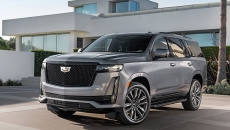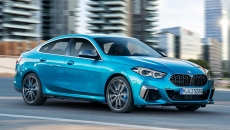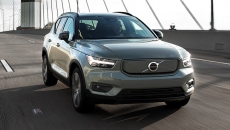Gas-powered light-duty pickups are a go-to choice for people needing to tow a trailer. But electric light-duty pickups are muscling their way into the market, too. Demand is high for the Ford F-150 Lightning and the Rivian R1T, and the Chevrolet Silverado EV is set to debut this spring. Some versions of these trucks are rated to tow around 10,000 pounds, which is enough to pull a medium-sized travel trailer or toy hauler. But towing with an electric vehicle is a different experience than current truck owners might be used to. Edmunds’ experts share their insights on towing with an EV truck.
PREPARE FOR A LOSS IN RANGE
Regardless of the type of vehicle, towing a trailer or boat causes a reduction in fuel efficiency — and therefore range — compared to normal operation. This unavoidable problem of physics is more of a concern in an EV because of the already limited amount of range compared to a gas-powered vehicle.
For example, a 2022 Ford F-150 Lightning with its extended-range battery has an EPA-estimated range of up to 320 miles on a full charge. That’s solid for a modern EV. But it pales in comparison to a gas-powered F-150, which can have a range upward of 500 miles on a full tank.
The reduction in range from towing will depend on many factors, including what EV you’re towing with, what you’re towing, elevation changes, weather conditions, and the speed you’re driving at. But here’s an example, based on Edmunds’ testing: Towing a trailer with an EV truck required about 27% more electricity usage than it would without a trailer. That resulted in a 27% decrease in maximum range. As such, our example F-150 Lightning, hooked up to a trailer, would be left with roughly 234 miles of range to work with.
Tip: Stick to the speed limit on highways. Even going 10 mph over the speed limit can have a significant impact on range.
PLAN AHEAD FOR YOUR CHARGING
The reduced range won’t be an issue if you’re only making a short trip with a trailer attached. But longer road trips, which are typically needed when one is towing a trailer or boat for recreation, can be problematic. You’ll need to plan your route in case you need to stop and recharge along the way.
The infrastructure for DC fast-charging stations is still in its infancy and can’t be relied upon in the same way as gas stations can. Charging locations are not nearly as prevalent as gas stations. On top of that, some chargers may be broken or already in use when you arrive.
Tip: If you can, plan your charging stops so that you’ll have enough range as an emergency buffer to allow you to drive to another charging location if needed.
CHARGING SESSIONS WILL TAKE TIME
Different factors will influence how long you’ll need to charge, including how powerful the charging station is, how much power your EV can accept during fast charging, and how close to 100% you want to charge to. EV trucks typically have higher-capacity batteries that take longer to charge, too. As a general guide, expect to spend 20-40 minutes for a typical charging session during a multi-stop road trip.
Charging an EV that’s connected to a trailer can also be problematic because most public charging stations are positioned on curbs next to parking spots. It’s likely that you’ll need to unhook your trailer in order to position your truck properly to get it connected to a charging station’s power cord. Unhooking and reconnecting your trailer will use up valuable minutes on your drive.
Tip: It’s important to know the maximum theoretical charging capability of your EV and use charging stations that will support it. But be understanding when reality sets in and you’re stuck charging at a slower speed than you hoped for.
ELECTRIC POWER ADVANTAGES
We’ve painted a dour picture so far but there are upsides. The first is power. An F-150 Lightning with the optional extended-range battery produces a robust 580 horsepower and 775 lb-ft of torque. And unlike a traditional truck, that maximum torque output is available as soon as you press on the accelerator to help get you moving promptly and keep you steady on grades. EVs also don’t lose power at elevation as internal combustion engines do. Finally, in our test, the cost of recharging an EV truck for a given distance driven was less than refueling a traditional truck.
EDMUNDS SAYS: In the short term, towing with an electric truck on longer trips will be less convenient than towing with a traditional light-duty truck. The extra stops needed for recharging add extra time and hassle. But there are advantages to towing with an EV, too. Long term, the future is bright for EV truck towing.

